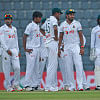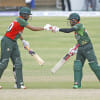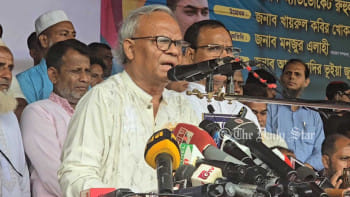Bangladesh cricket is in shambles, and BCB must answer for it

Bangladesh cricket seems to be on life support right now. The administration and management of the sport at the hands of Bangladesh Cricket Board (BCB) is unable to not simply provide a holistic platform that can provide concrete results on the pitch, but is clearly and concerningly symptomatic of an unprofessional sport management system which continues to fail in providing long-term solutions for the development of the game. I am no cricket expert, therefore I am not in a place to discuss the specific issues that Bangladesh faces on the pitch. Hence, in this column, I will discuss certain core challenges that the BCB needs to overcome as the premium sporting body in the country – and do so through the lens of administrative policy, governance and best practices.
Let's start with the notion of accountability. The leadership of the BCB – ranging from the president to the directors – are officially voted in via elections. But it would be ignorant to not mention the implicit blessings from the heart of the national political leadership that plays the primary role in deciding who runs the show – the tenure of the current BCB president is evidence enough to show the serious lack of democracy and professional accountability within the national cricket authority. Add to this the absurd back and forth which the BCB executives have with the media, which is frankly quite embarrassing. From overreaching in discussing personal perspectives on team management to publicly criticising players under contract with the board, one has witnessed enough across the media to recognise the unprofessional conduct by certain household names in Bangladesh cricket. I do believe that this has aided in creating a culture of anxiety, discontent and distress among Bangladeshi cricketers. The serious ambivalence in cultivating a professional and accountable communications strategy on part of board officials is nothing short of incompetency.
I don't intend to mention any names, nor do I hope to attack anyone personally. But we have all seen instances of how board officials have spoken to the media and created unnecessary controversies regarding the players. This trend must stop. The first item on the agenda to reform cricket should be via an independent audit of the BCB, perhaps by hiring a professional management firm or by appointing a judicial commission. The lack of an efficient and professional governance system is a key barrier that needs to be immediately overcome in the interest of preserving the integrity of the game and to promote a long-term plan beyond politics and personal reward. An independent audit will provide key findings which can then be addressed to improve the systems and normative structures with respect to the administration of the game.

Defining the role of cricket executives via concrete rules and procedures – and holding them to account – is crucial. Differentiating between the roles of the team management in the national setup versus cricket administrators is equally important. Administrators strategise, plan and govern the long-term development of the game; they set the vision and culture by identifying goals. They work towards addressing systematic barriers with regards to the growth of the sport, and focus on enhancing the infrastructural system that can create the basis for the evolution of a three-tier system for the three formats of cricket. The team management picks the team – it is quite simple, really. Therefore, cricket executives and administrators should play little to no role in sharing their opinions regarding the selection of players.
Broader questions of corruption and politicisation cannot be ignored either. The Transparency International published the Global Corruption Report in 2016, which investigated the governance challenges that sports bodies such as the BCB faced with respect to income generation mechanisms. An array of self-inflicted problems concerning fixing and betting scandals, the corporate structures of teams in BPL and, broadly speaking, the categorical ignorance towards domestic competitions such as the Premier League is indicative of troubling levels of corruption and policy failures within the BCB. So, to put it simply, not only does the richest sporting body in Bangladesh have an outrageously preposterous organisational culture, but at the same time it has become an unfortunate hotbed for controversies beyond the game itself.

Cricket has moved beyond activities on the pitch, so having an all-inclusive approach towards the development of our players will bode well. Getting assistance from communications, nutrition and well-being experts to train our cricketers with regards to media engagement and promoting an athletic lifestyle is integral to thus end. I believe that the relative success that Bangladesh has had in the ODI format is due to the sheer class and aptitudes of certain core players. The Big 5, as we know them, have entered or are entering the swansong of their careers. And in recent times, the tragedy that has been the handling of a senior pro like Mahmudullah in the past two months reminds us of how abysmal the BCB is in managing its contracted players. But, as was the case with former Captain Mashrafe Mortaza, a lack of clarity and professional communication on the BCB's part is distressing and has given enough reasons to even the senior-most players in the national setup to voice their concerns regarding the state of cricket.
Goal-based sports management has been absent in Bangladesh cricket due to the individualisation of the BCB. Undemocratic and deeply unaccountable leadership structures have been barriers towards the sport's development. At the end of the day, if those responsible for the advancement of cricket are themselves unable to work within a framework that is institutionally accountable, then cricket in Bangladesh will see little to no long-term progress.
Mir Aftabuddin Ahmed is currently pursuing a master's degree on public policy programme at McGill University in Canada.


 For all latest news, follow The Daily Star's Google News channel.
For all latest news, follow The Daily Star's Google News channel. 









Comments